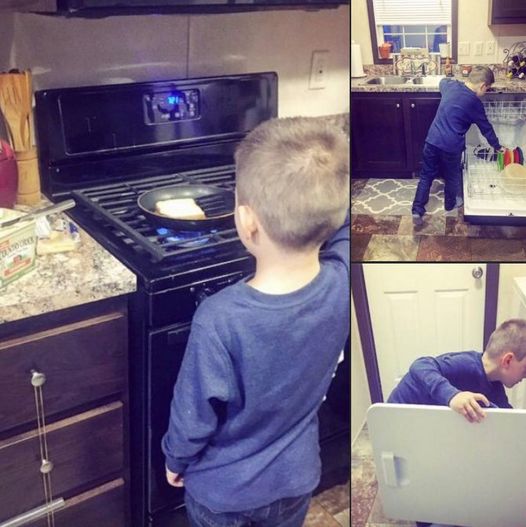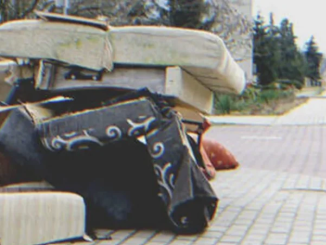
How we choose to raise our children and the lessons we decide to ingrain in them from an early age differs from parent to parent.
It’s only natural, of course. Some mothers and fathers take a more disciplined approach, for example, while others prefer to let their kids go through a try and fail cycle so that they can learn right and wrong through their own experiences.
Now, for the most part, how one chooses to style their son or daughter’s upbringing is their business, no one else’s. Yet that doesn’t stop people commenting and criticizing online every time a debate is sparked over some parental decision or another…
I remember when I was younger, doing chores was considered part and parcel of everyday life. I mean for me and my siblings, of course, not only my mother.
Doing dishes, making beds, helping to prepare food before mealtimes… the list goes on and on.
I understand times change, but in my mind getting children to help out with tasks around the house – providing there’s no danger involved – is a great way to instill values and a worth ethic that will come in handy later on.

It seems, though, that not everyone agrees. According to reports, one mother found this out the hard way a few years back after she uploaded pictures of her son and shared her method of giving him chores to do with the internet.
The mom in question, 22-year-old Nikkole Paulun, reportedly explained how she proudly put her 7-year-old son, Lyle, to work around the house, where he would help out with things like cooking and cleaning.
Nothing too dramatic, I’m sure we can all agree, but that didn’t stop online detractors from verbally attacking her and expressing concern over the potential impact on the child’s emotional well-being.
The bulk of the critics targeted the fact that the mother had shared her son’s chores online, not only potentially making other parents question themselves, but also flagging the idea that the child might not want to have his daily activities shared with a large number of strangers online.
One woman went as far as to write in the comments that Nikkole couldn’t just let her child “be your slave. Or to do the chores that you yourself don’t want to do.”
Another wrote: “So I take it you can do everything ur teaching ur son to do or are you just putting pressure on ur child?”
A third added: “Don’t get me wrong… a child should know responsibility. .. but should not be operating a stove that young.“
A fourth wrote: “Lazy mother’s are sweeping the country. It’s good to teach them while they’re young but i notice alot of these single mom’s are just raising their boy’s to be the man that they wish they always had.“
There were many who defended Nikkole in the comments, too, with her post gaining viral status after it garnered over 8,000 comments and 156,000 interactions on Facebook.
Nikkole herself insisted that she enjoys doing housework and that her son Lyle “just helps along the way & earns allowance as well.
What’s more, she added that her then-one-year-old daughter, Ellie, would be following in her elder siblings steps and doing the same thing when she was a little older.
What do you think to Nikkole’s parenting approach and the criticism she got for it? Let us know your thoughts in the comments box.
Natural Remedy for Skin Imperfections: Banana Peels and Baking Soda
Are you tired of dealing with skin imperfections like wrinkles, blemishes, melasma, moles, and warts? Look no further! We have a natural and effective solution for you that’s easy to use and utilizes the unique properties of banana peels and baking soda to help improve your skin’s appearance.
Why Banana Peels and Baking Soda?
Banana Peels: These peels are not just food waste! They are packed with antioxidants, vitamins, and minerals that can nourish and revitalize your skin. Banana peels contain lutein, an antioxidant that reduces inflammation and enhances skin elasticity, helping to minimize wrinkles.
Baking Soda: Known for its exfoliating properties, baking soda gently removes dead skin cells and promotes new cell growth. This helps reduce the appearance of blemishes and other skin imperfections.
How to Use Banana Peels and Baking Soda for Skin Care
Ingredients:
- 1 ripe banana peel
- 1 tablespoon of baking soda
Instructions: Prepare the Mixture
- Scrape the inner white part of the banana peel with a spoon and collect about 2 tablespoons of the material.
- In a small bowl, mix the banana peel paste with the baking soda until a smooth paste forms.
Application
- Thoroughly clean and dry the area of skin where you intend to apply the mixture.
- Apply the paste directly to the areas affected by wrinkles, blemishes, melasma, moles, or warts.
- Leave the mixture on for about 15-20 minutes.
Rinse Off
- Wash off the paste with lukewarm water. Be gentle to your skin while washing to avoid any irritation.
Moisturize
- After drying your skin, apply a gentle moisturizer to keep your skin hydrated and protected.
Tips for Best Results
Frequency of Use: To see significant improvements, use this treatment two to three times a week. Consistent application is key!
Patch Test: Before applying the mixture broadly, always perform a patch test on a small area of skin, especially if you have sensitive skin.
Sun Protection: Protect your skin from the sun, especially after using this treatment, as the skin may be more sensitive to UV rays.
Precautions
- Remember that while natural remedies can be beneficial, they are not cures for medical conditions. If you have moles or warts, it’s important to have them checked by a healthcare provider before trying any home treatments.
- Baking soda can be drying and may irritate sensitive skin. If you experience any redness, itching, or discomfort, discontinue use and consult with a dermatologist.
This banana peel and baking soda remedy offers a simple, cost-effective way to improve your skin’s appearance naturally. Say goodbye to harsh chemical treatments and give this gentle alternative a try. Your skin will thank you!




Leave a Reply